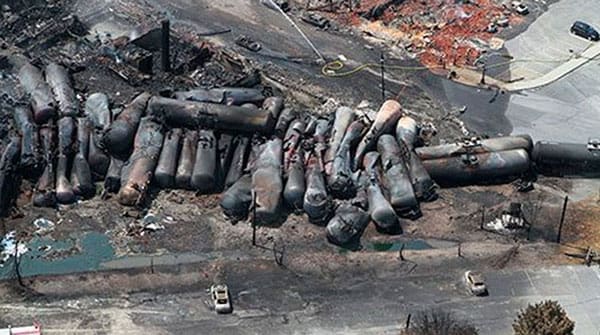Quebec Man’s land slashed in half due to the 2013 railway tragedy and the compulsory expropriation of his land
 Kurt Lucas of Frontenac, Quebec, did not realize a railroad tragedy in 2013 would one day lead to his 125-acre property, which has been in his wife’s family since the 1970s, being cut in half.
Kurt Lucas of Frontenac, Quebec, did not realize a railroad tragedy in 2013 would one day lead to his 125-acre property, which has been in his wife’s family since the 1970s, being cut in half.
Lucas lives in a community about five kilometres east of Lac-Mégantic. Lac-Megantic became known to Canadians when a train carrying crude oil crashed into the town’s centre, killing 47 people. After the tragedy, a government-led investigation determined the railway needed to be moved out of town. Officials with Transport Canada proposed a rail bypass that will lead to expropriation for 43 local landowners.
Lucas told the CBC that he bought the land from his wife’s family only months before the tragedy, and now they are concerned about access to their own land as well as issues surrounding water quality and noise from the train. The land is zoned agricultural, so he would receive a lower monetary value from the expropriation of lands that have been in his wife’s family for decades.
Lucas is one of many Canadians on the receiving end of compulsory expropriation. Individual landowners face a massive power imbalance where governments at all levels and rich businesspeople have time and resources to get the best deal from expropriations, whereas they do not. Governments and businesses often work together and can afford to hire teams of lawyers and lobbyists to undermine individual property rights.
Expropriation is one of the most drastic ways property rights can be undermined. But while Canadians have access to a common law that assumes governments will compensate landowners and not act arbitrarily, there is a problem: governments can deny or undermine these rights in law. In other words, our property rights exist at the whim of politicians.
Many are unaware that when the Charter of Rights and Freedoms was introduced, the original package included a clause protecting Canadians from arbitrary denial of property rights and a right to fair compensation. After two rounds of negotiations, however, property rights lost out when certain provinces and the federal NDP insisted on excluding them.
The British common law that underpins our system assumes compensation is provided when our property is expropriated. There have also been court judgments favouring landowners against so-called de facto expropriations, where land use regulation removes all reasonable uses for the land. In Annapolis Group Inc v. Halifax Regional Municipality (2022), the Supreme Court of Canada clarified the rules, reaffirming that zoning regulations may create a claim for compensation if all reasonable land uses are removed from a landowner.
However, the court added that governments can still limit rights to compensation if it is made in clear language in law.
By enshrining property rights into our constitution, certain aspects of property rights would be removed from the purview and control of politicians. In the Lac-Megantic example above, while constitutional protection would likely not prevent expropriation, it would place the matter outside of political whim and ensure landowners had their rights protected.
There are relevant precedents for enshrining rights to property. Our British parliamentary tradition has maintained it since the Magna Carta and the English Bill of Rights. The United Nations Universal Declaration of Human Rights explicitly includes property rights protection. The 1960 Canadian Bill of Rights also singled out property rights for protection. It is only due to political horse-trading during Charter negotiations that Canadians lost the protection of property rights. Canada would only be following the lead of other advanced democracies, such as the United States, Germany, Italy and Finland, in constitutionally entrenching property rights.
After 10 years, the Frontier Centre for Public Policy is about to release a newly revised Canadian Property Rights Index highlighting where governments are protecting and not protecting our cherished property freedoms. The Index underscores that a fundamental problem in Canada is that many of our rights exist at the whim of legislators. It is time to revisit the issue of property rights in our constitution. To avoid activist judges re-interpreting what it means, the clause must be written in unambiguous language favouring a limited government reading.
It’s time to place our cherished rights into our most cherished document.
Joseph Quesnel is a senior research associate with the Frontier Centre for Public Policy. He is the author of the Canadian Property Rights Index. The Index will be released on July 17.
For interview requests, click here.
The opinions expressed by our columnists and contributors are theirs alone and do not inherently or expressly reflect the views of our publication.
© Troy Media
Troy Media is an editorial content provider to media outlets and its own hosted community news outlets across Canada.


